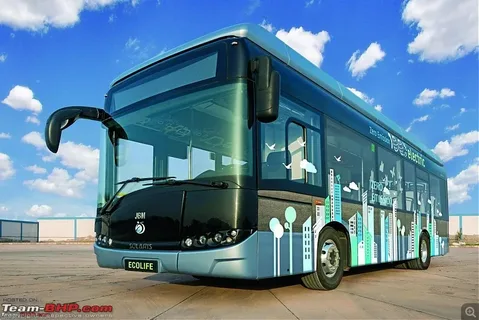
The global electric bus industry is expected to be valued at USD 21.3 billion in 2024, with projections indicating it will reach USD 68.5 billion by 2034, growing at a CAGR of 12.4%.
The sector has witnessed substantial growth in recent years, driven by increasing environmental awareness, supportive government policies, and advancements in technology. As global communities place greater emphasis on sustainability and reducing greenhouse gas emissions, electric buses have become a key solution for transforming public transportation systems into more eco-friendly alternatives.
The Electric Bus Industry is experiencing significant growth, fueled by the global push for sustainable, low-emission transportation solutions. As governments, municipalities, and transit authorities strive to meet climate goals and reduce air pollution, electric buses are emerging as a preferred choice for public transport fleets worldwide.
Electric buses provide a cleaner, quieter, and more energy-efficient alternative to traditional diesel-powered buses, offering substantial long-term cost savings due to reduced fuel consumption and maintenance requirements. With major cities across the globe increasingly committing to decarbonizing their public transportation systems, the demand for electric buses is expected to soar in the coming years.
Technological innovations, such as improved battery life, faster charging, and enhanced range, are further accelerating the adoption of electric buses. Additionally, supportive government policies, including subsidies, incentives, and stricter emissions regulations, are expected to drive substantial growth in the electric bus market, particularly in North America, Europe, and Asia-Pacific.
The market is also witnessing the emergence of electric bus manufacturers offering innovative and customizable solutions to cater to different operational needs, such as urban, intercity, and long-distance routes, contributing to the overall expansion of the market.
Key Drivers
- Government Incentives and Regulatory Support:
- Many governments are introducing tax incentives, subsidies, and grants to encourage the adoption of electric buses. Stricter emissions regulations and climate action goals are compelling cities to transition to electric fleets, boosting market growth.
- Environmental Benefits and Sustainability Initiatives:
- Growing concerns about air quality and climate change are driving the adoption of electric buses as a key solution for reducing carbon emissions. Electric buses contribute to cleaner air in cities and help governments meet sustainability targets.
- Technological Advancements in Battery Technology:
- Improvements in battery energy density, charging infrastructure, and battery management systems are making electric buses more reliable, cost-effective, and viable for large-scale deployment. Longer ranges, faster charging times, and reduced battery costs are critical factors driving adoption.
- Cost-Effectiveness and Lower Operating Costs:
- Electric buses have lower fuel and maintenance costs compared to diesel-powered buses, making them an attractive option for fleet operators seeking to reduce operational expenses in the long term.
- Public Demand for Cleaner Transportation Options:
- There is a growing public preference for eco-friendly, sustainable transportation, driven by awareness of environmental issues. Citizens in urban areas are increasingly advocating for cleaner public transport options, which further fuels the demand for electric buses.
Exhaustive Market Report: A Complete Study
Key Takeaways
- The Electric Bus market is poised for significant growth, with a projected CAGR of X% from 2024 to 2034, as the transition toward greener, more sustainable public transportation solutions accelerates worldwide.
- Asia-Pacific is expected to dominate the electric bus market, driven by large-scale adoption in countries like China and India, where governments have implemented aggressive policies to promote electric mobility. Europe and North America are also key markets, supported by favorable regulations and increasing public demand for clean transport solutions.
- Battery technology advancements continue to be a key growth driver, with improvements in energy efficiency, charging infrastructure, and battery costs making electric buses more viable for large-scale deployment in urban environments.
- Government regulations and policy initiatives focused on reducing emissions and promoting clean energy are crucial in driving the transition to electric buses. Policies such as zero-emission vehicle mandates, city bans on diesel buses, and incentives for fleet operators will fuel market growth.
- Increased investment in charging infrastructure is critical for the widespread adoption of electric buses. The establishment of dedicated charging networks, particularly in metropolitan areas, is essential for ensuring the operational efficiency and range of electric buses, enabling their growth in public transport systems.
Leading Electric Bus Sector Brands
- BYD Company Limited
- AB Volvo
- Proterra
- Man Se
- Nissan Motor Corporation
- Ashok Leyland Limited
- Daimler Truck AG
- Zhengzhou Yutong Bus Co., Ltd.
- TATA Motors Limited
- Hyundai Motor Company
Key Segmentations
By Propulsion Type:
The market is classified into BEV and FCEV.
By Battery Type:
The industry is subdivided into NMC, LFP, and NCA.
By Consumer:
On the basis of consumers, the sector is grouped by private and government.
By Range:
The sector is segmented into upto 200 miles and above 200 miles.
By Power Output:
Based on power output, the industry is segmented into Upto 250 kW and above 250 kW.
By Region:
Analysis of the market has been carried out in key countries of North America, Latin America, Western Europe, South Asia, East Asia, Eastern Europe, and the Middle East and Africa.
About Future Market Insights (FMI)
Future Market Insights, Inc. (ESOMAR certified, recipient of the Stevie Award, and a member of the Greater New York Chamber of Commerce) offers profound insights into the driving factors that are boosting demand in the market. FMI stands as the leading global provider of market intelligence, advisory services, consulting, and events for the Packaging, Food and Beverage, Consumer Technology, Healthcare, Industrial, and Chemicals markets. With a vast team of 400 analysts worldwide, FMI provides global, regional, and local expertise on diverse domains and industry trends across more than 110 countries.
Contact Us:
Future Market Insights Inc.
Christiana Corporate, 200 Continental Drive,
Suite 401, Newark, Delaware – 19713, USA
T: +1-347-918-3531
For Sales Enquiries: sales@futuremarketinsights.com
Website: https://www.futuremarketinsights.com
LinkedIn| Twitter| Blogs | YouTube
